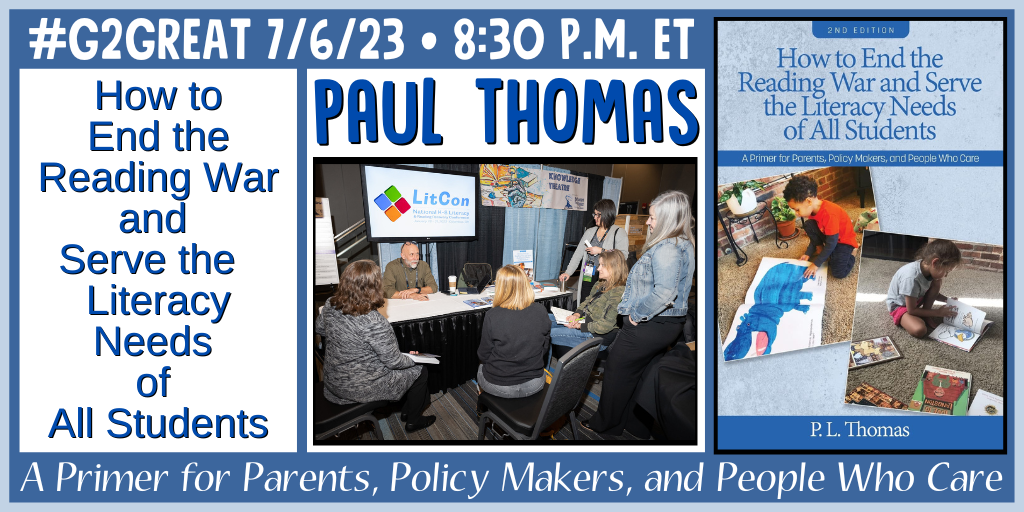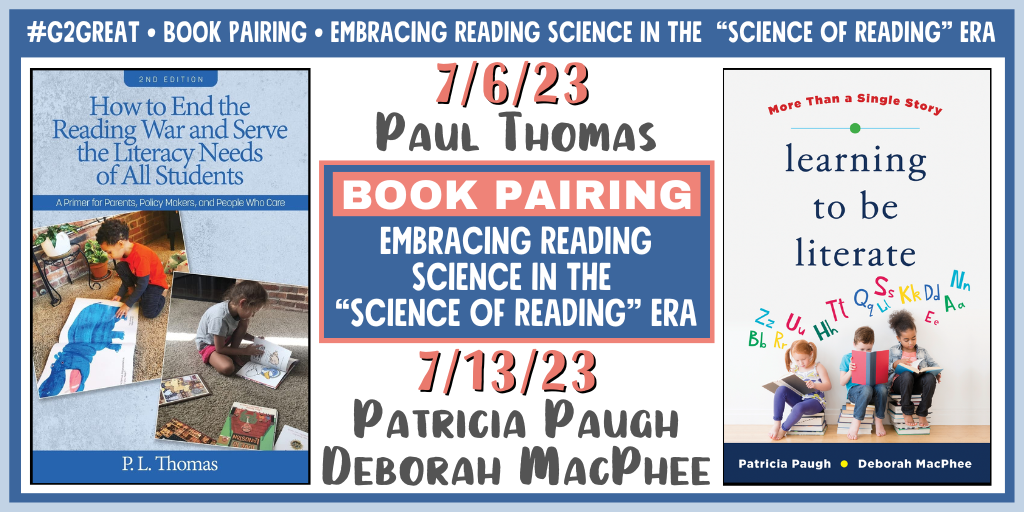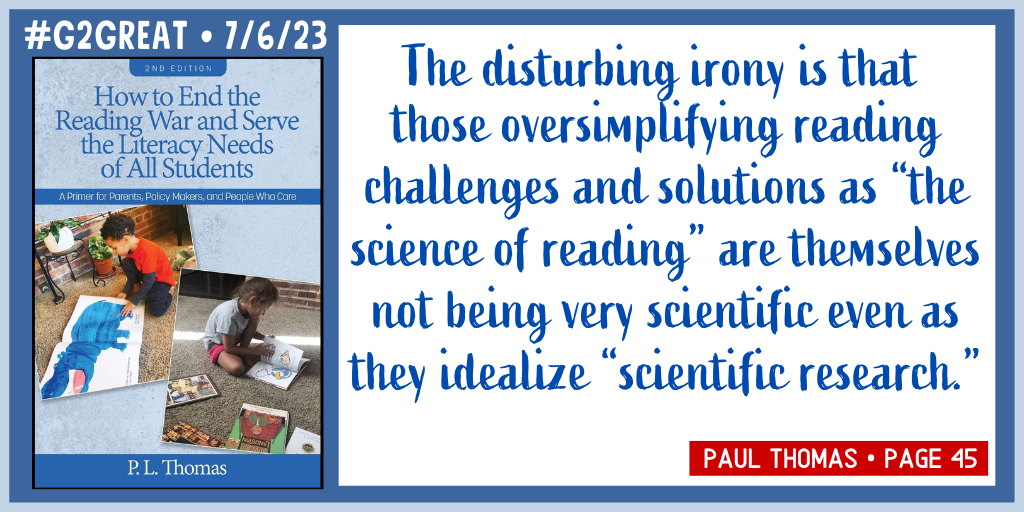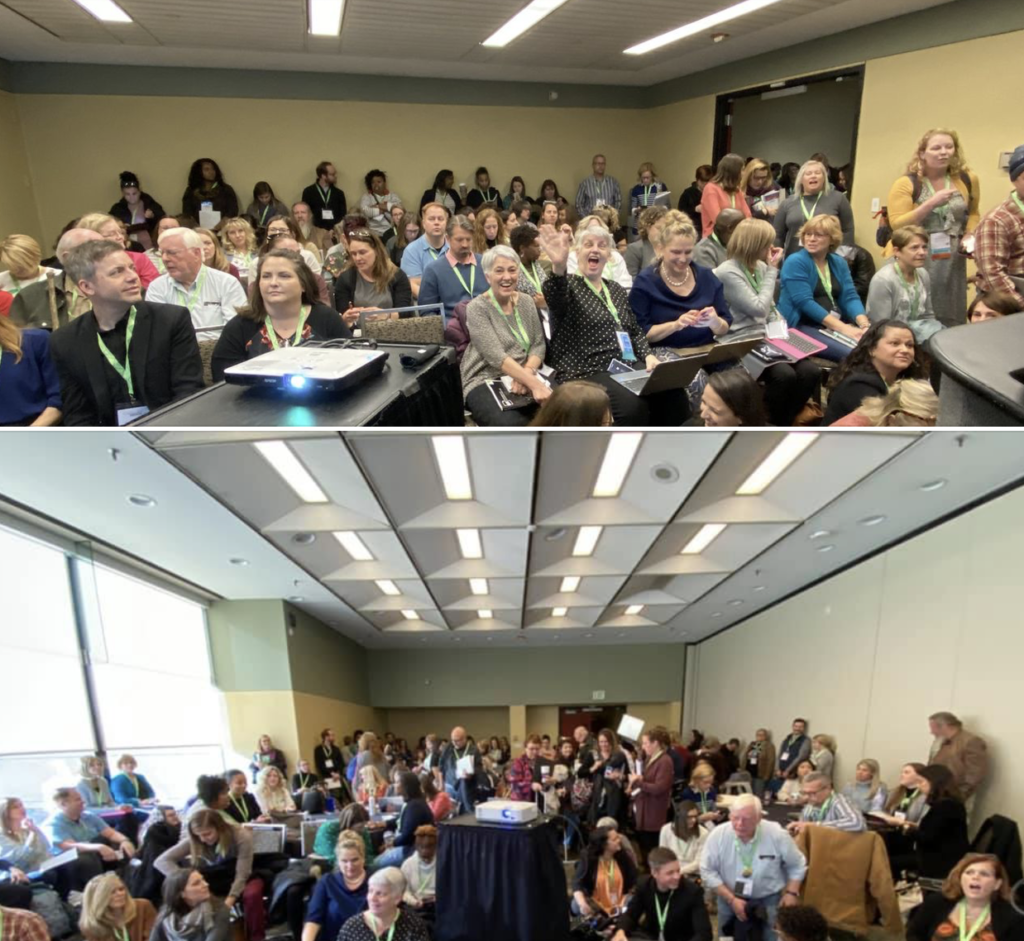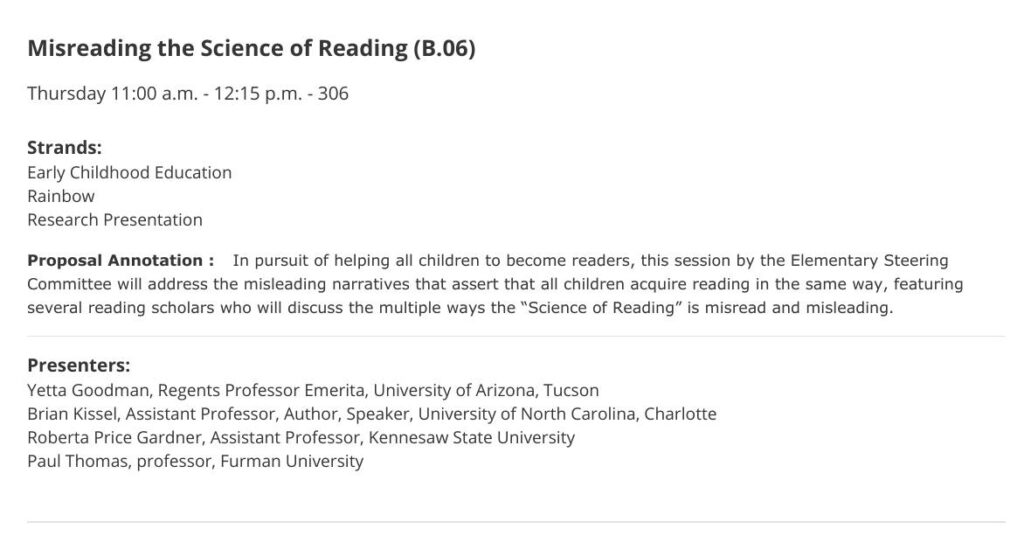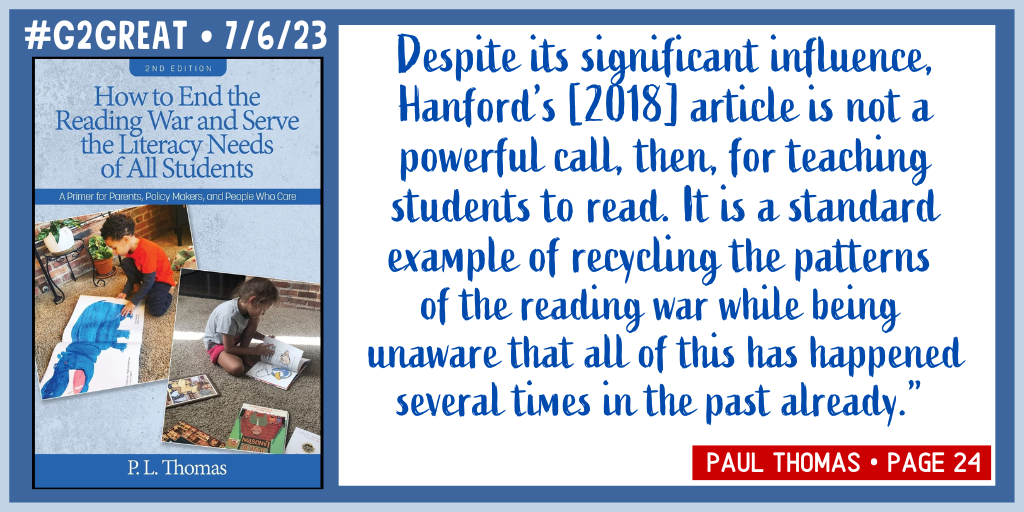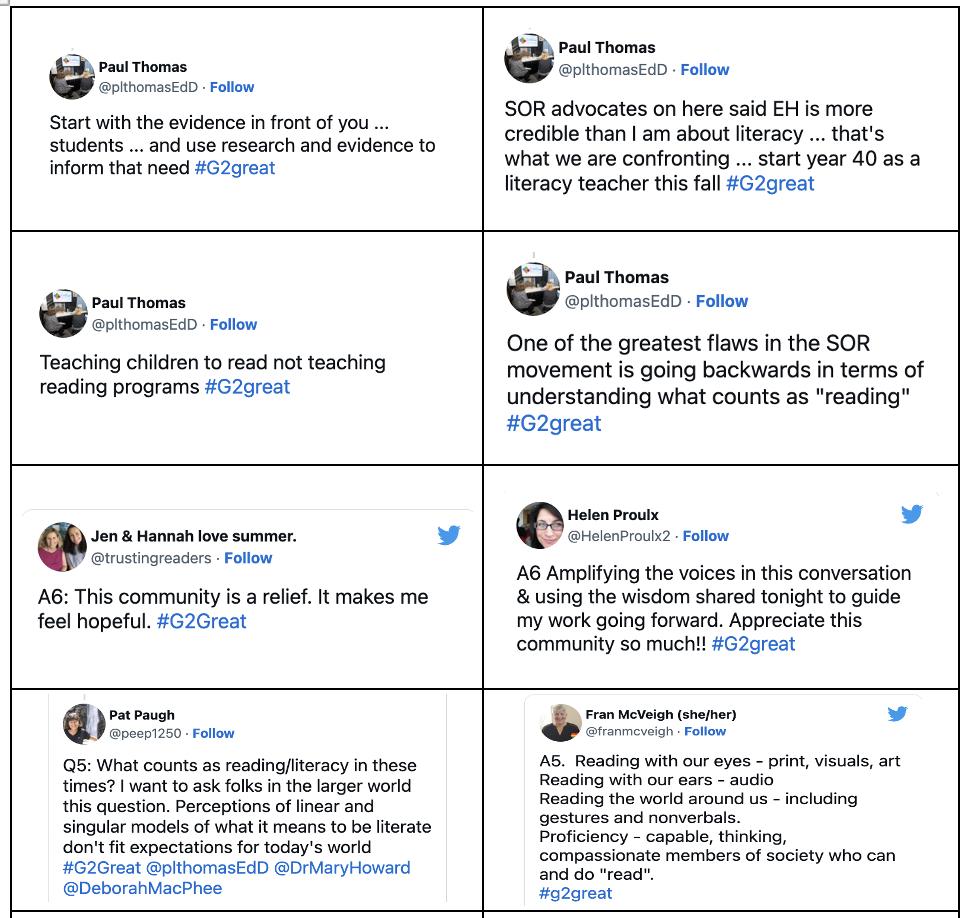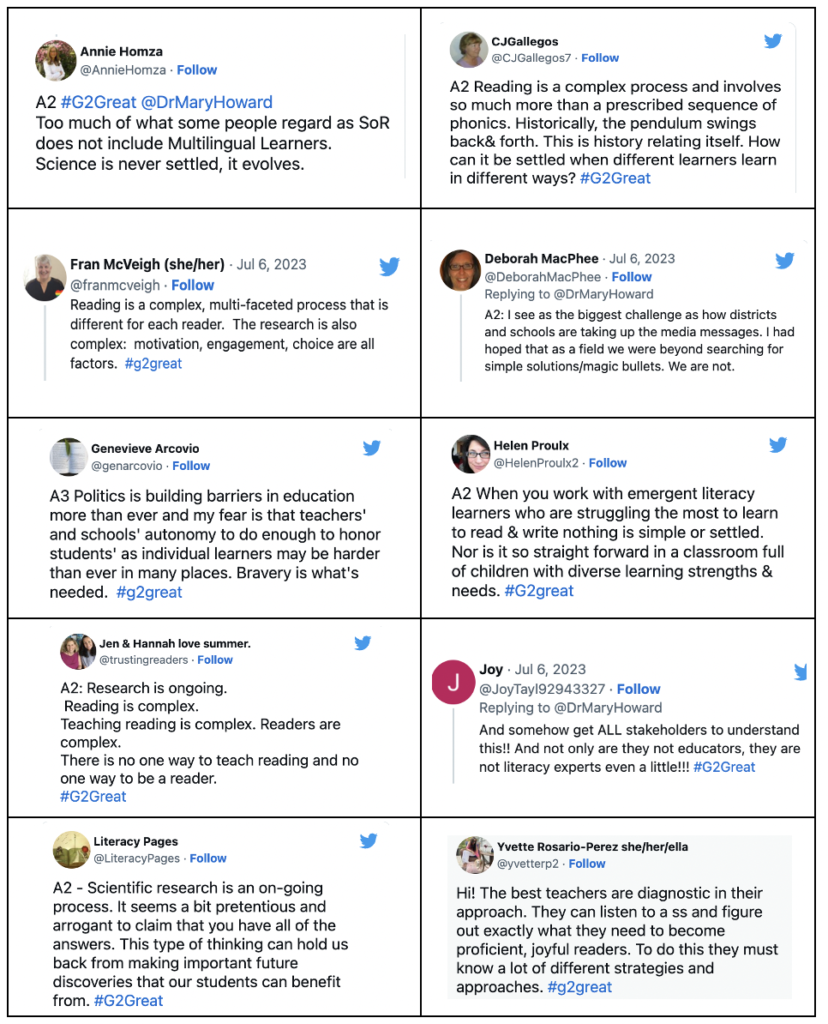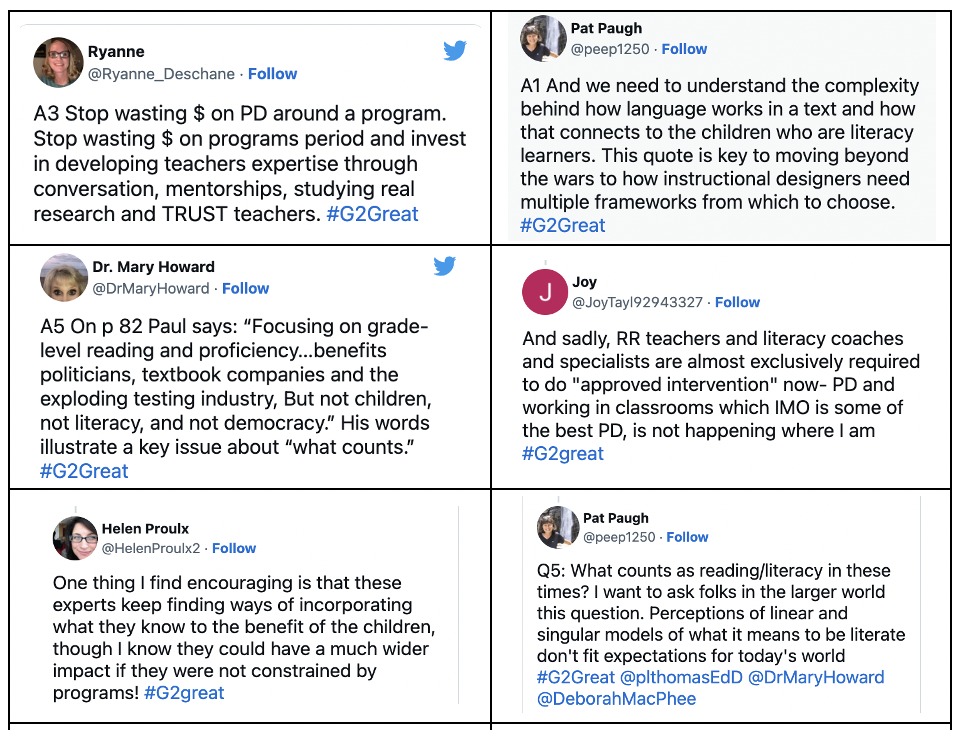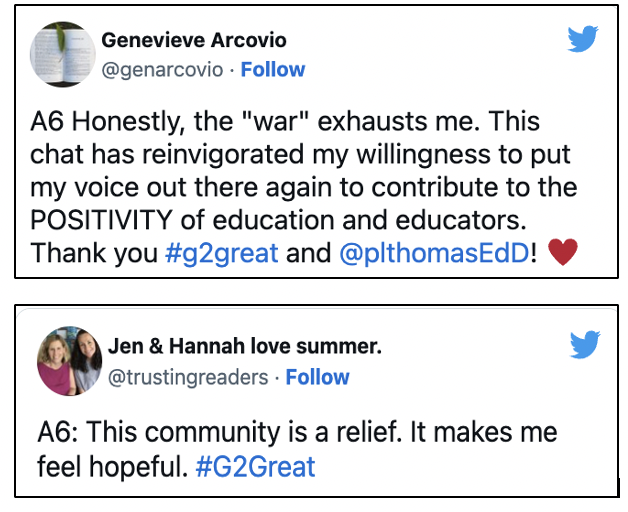
You can read our #G2Great Wakelet Artifact HERE
Written by Mary Howard
On 7/13/23, we had the great pleasure to welcome guest hosts, Patricia Paugh and Deborah MacPhee to #G2great chat. We were all eager to engage in a lively discussion about their new book, “Learning to be Literate: More Than a Single Story” (2023, WW Norton Professional Books). We weren’t surprised that a passionate discussion ensued.
This was the 2nd half of a two-part book pairing including Paul Thomas:
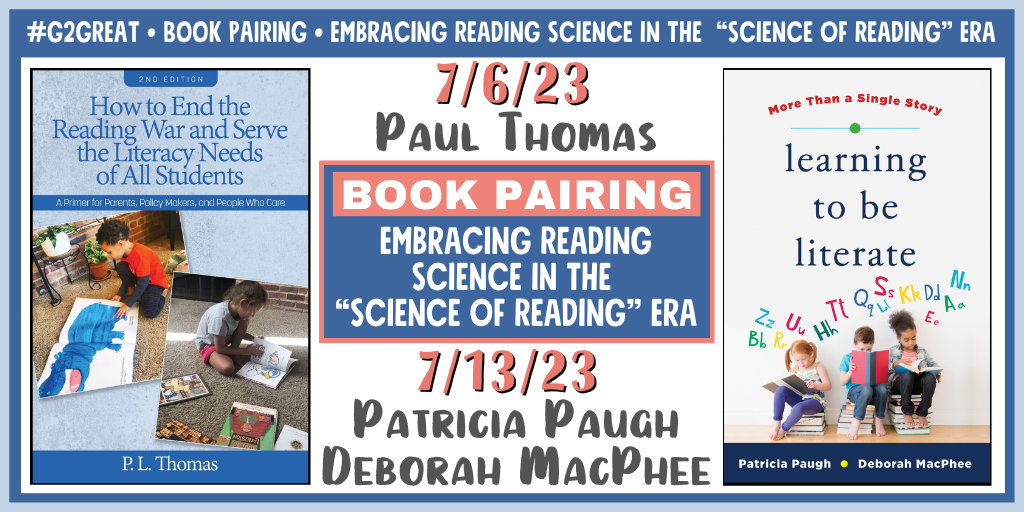
Embracing Reading Science in the “Science of Reading” Era (see my post HERE)
I first met Deborah at the 2019 International Reading Association Annual Conference. After an early morning session with P David Pearson and Nell Duke: What Research Really Say About Teaching Reading and Why it Still Matters, I ran with Fran McVeigh to Deborah’s session with Sherry Sanden: Disrupting the Science of Reading Frenzy. See my notes HERE.
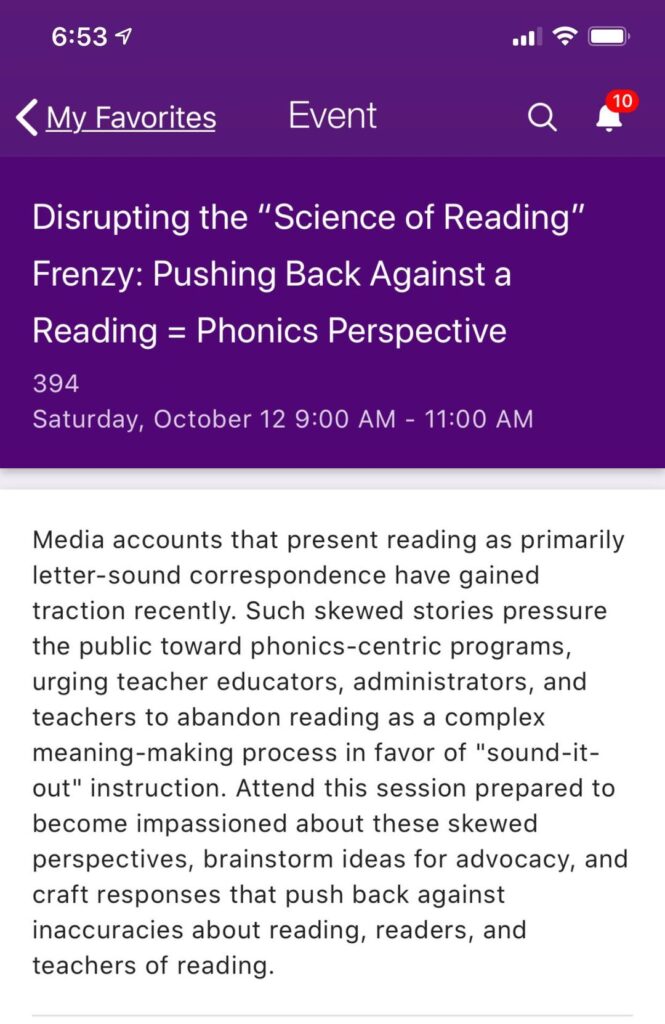
I felt such gratitude to be in that room and I feel the same gratitude for this brilliant collaboration that brought Pat and Deborah together! It seems like a full-circle moment.
Before the chat, we shared a quote reflecting a timely and relevant BOOK WHY:
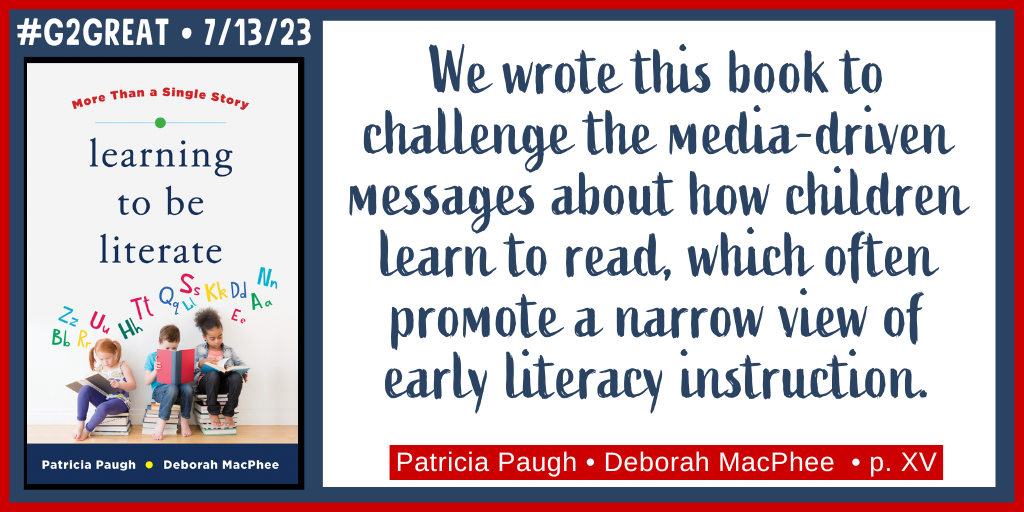
They extend that view on p. x adding: “The children are our inspiration.” Their shared emphasis that rises from every page is about honoring children. These five words are imprinted in my mind with the overarching imperative that we cannot honor our children unless we refuse to narrow the realm of possibilities as media-driven messages have expected us to do. We are not motivated to do this by engaging in a “reading war” but by showing that our dedication is to put the needs of children and the research that guides those decisions FIRST.
Let’s take this BOOK WHY deeper. When we celebrate our #G2great authors, we ask them to respond to three questions. Question #1 extends their point above:
What motivated you to write this book? What impact did you hope that it would have in the professional world?
Deborah: “I was motivated to write this book after reflecting on my own educational experiences as a student, teacher, coach, and teacher educator and realizing how at every turn I was influenced by the reading wars – or the politics surrounding teaching children to read. It’s difficult to be in the field of literacy education and not get caught up in the war metaphor/discourse. Becoming aware of how this discourse shaped and influenced my thinking opened space for me to recognize when I was responding to an idea, a curriculum, a practice from an ideological position rather than an informed one. It allowed me to see that at any given time I was not considering the full spectrum of knowledge around the learning and teaching of literacy. I hope that this book supports other educators in exploring multiple dimensions of knowledge that must inform practice if we are to serve all children well. We don’t have to choose a side. We can put children at the center and use the best knowledge available across multiple dimensions to be responsive educators.”
Pat: “Our book is an opus for me in seeking to provide a full range of understanding, what Deborah and I call a knowledge map, based in the literature on literacy education and with attention to the diversity of learners who populate our classrooms. In the introduction I talk about my own history as a reader and a literacy teacher. I was a first grade teacher and reading specialist for almost two decades. My education grounded me about the benefits of phonics instruction and also about the importance of providing an instructional environment that builds a sense of competence and agency in young readers. The ongoing debate known as the ‘reading wars” has never been productive. Every classroom in the city where I am now a teacher educator is full of learners who bring cultural, linguistic, ability, and social resources that must be attended to and tapped to develop a full learning program including strong skills AND attention to those learning resources. Teaching literacy is not a single story but instead requires all of us invested in quality literacy education to transcend the debate and access the range of knowledge available to move learning forward.”
These reflections are all important, but two key ideas below linger in my mind:
Deborah MacPhee: “We can put children at the center and use the best knowledge available across multiple dimensions to be responsive educators.”
Patricia Paugh: “Teaching literacy is not a single story but instead requires all of us invested in quality literacy education to transcend the debate and access the range of knowledge available to move learning forward.”
Their words are a reminder that a single story asks us to wear blinders to whatever doesn’t fit within the story that EACH child brings to the learning table. While the desire these days seems to be for a simple view of literacy, we recognize that ‘Learning to be Literate’ is complex and simplicity ignores that complexity. I’m inspired by the authors’ literary gift that focuses on what our uniquely diverse learners deserve based on the depth and breadth of knowledge about all that they bring to learning!
In keeping with that thought, I’d like to begin by sharing a few #G2Great Twitter-style reflections during our chat using our first question:

TWITTER RESPONSES TO Q1
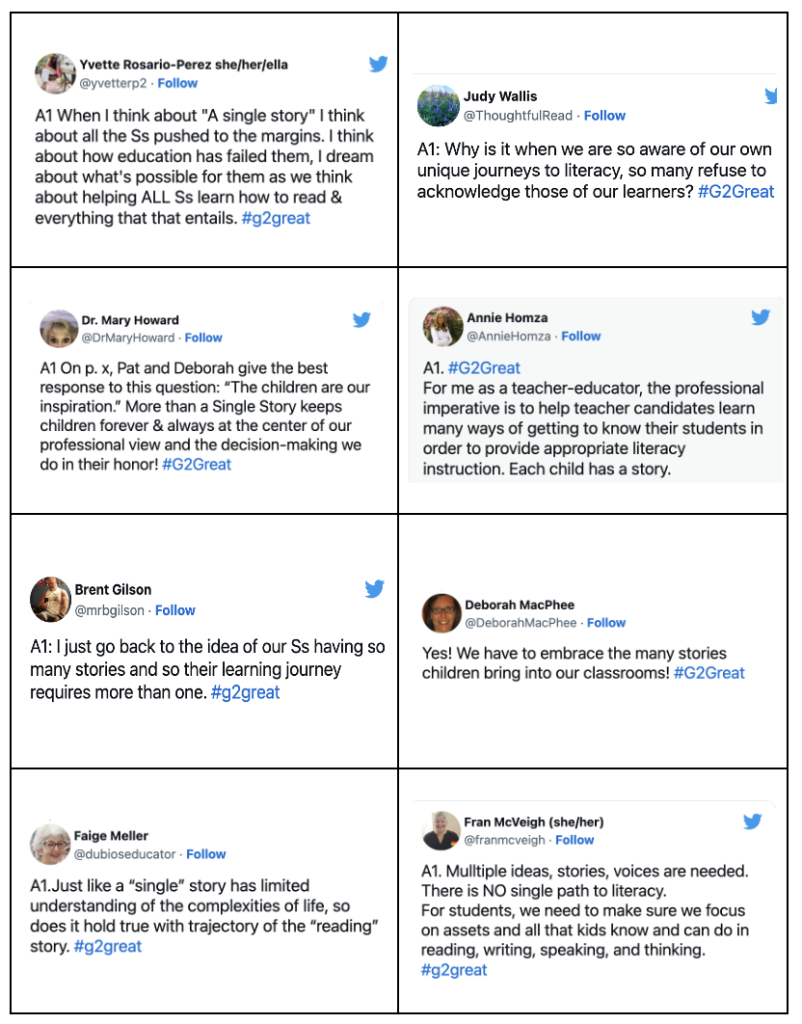
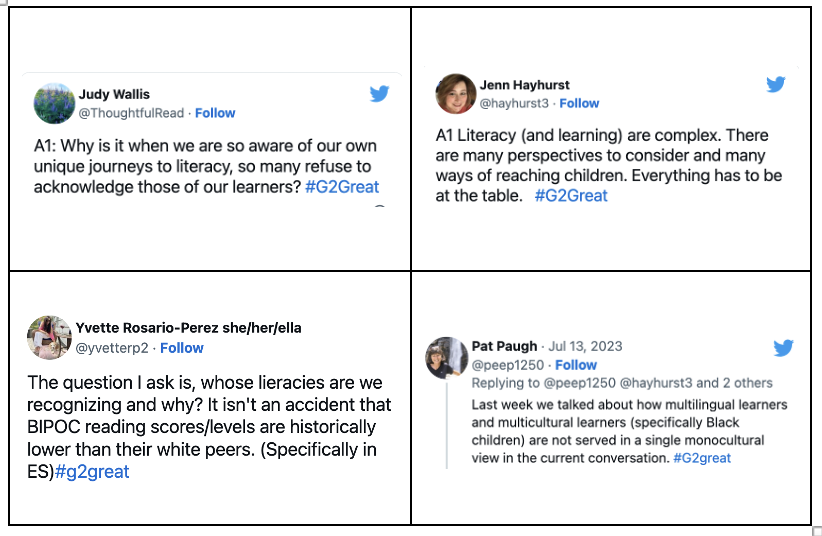
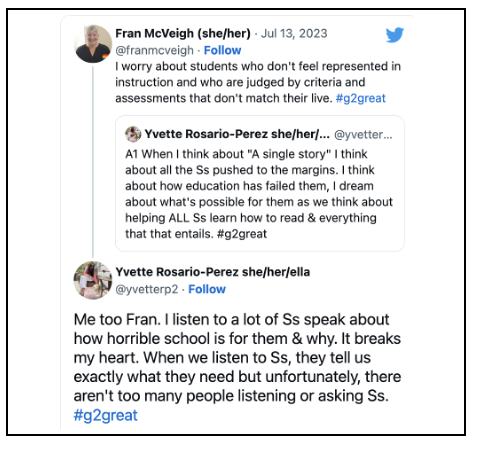
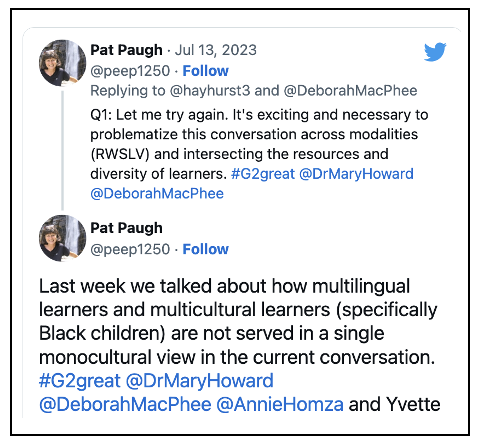
Note that you can see all #G2Great Twitter responses HERE
Early in the chat we also shared this quote from the authors.
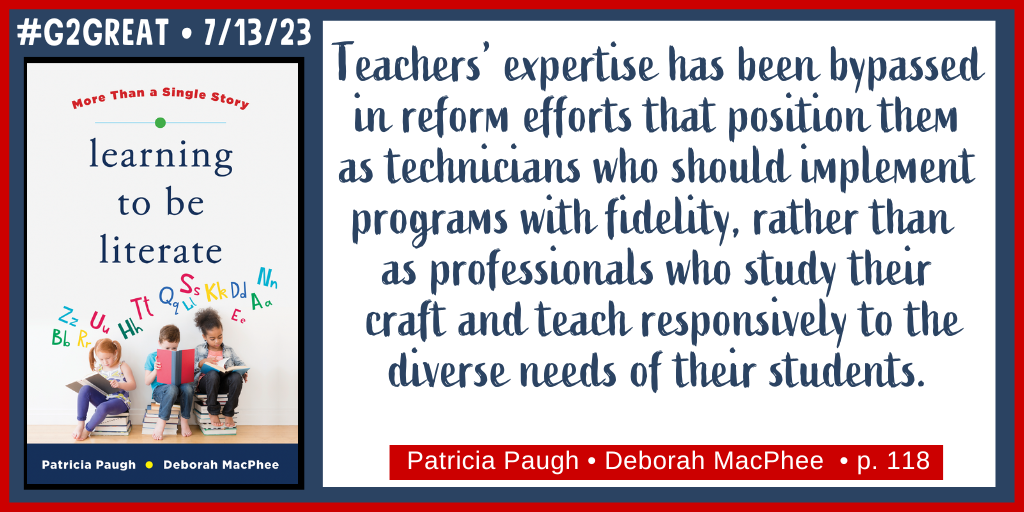
Since I selected tweets for our opening question (Q1), I’d like to do the same for our closing question (Q6) that relates to this quote and to the message of paying attention to “More Than a Single Story”:
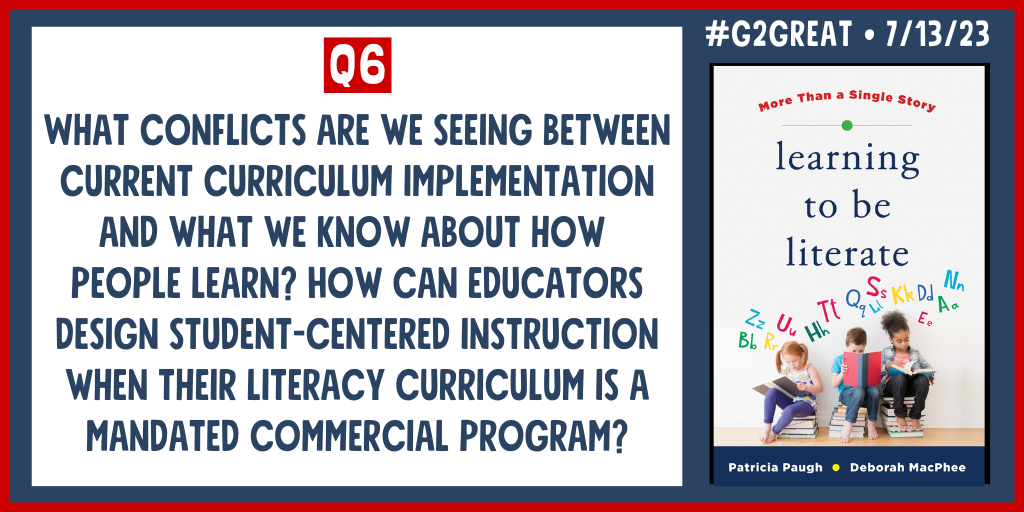
TWITTER RESPONSES TO Q6
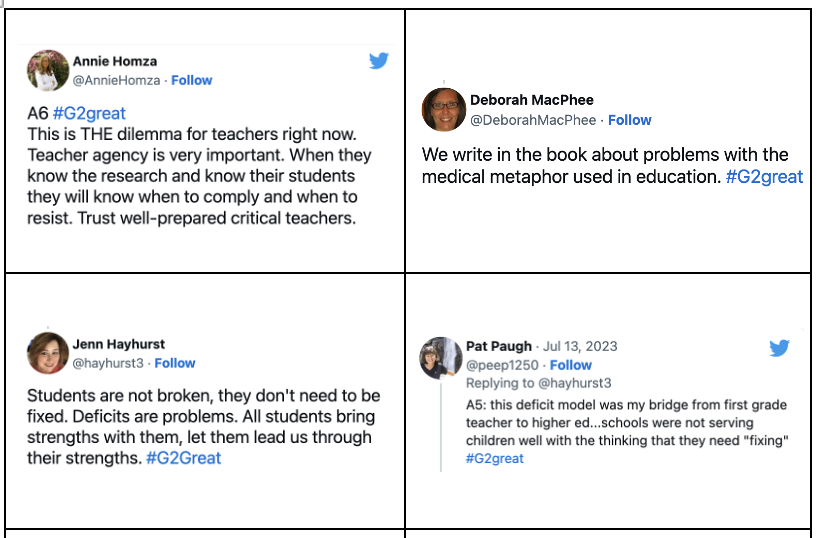
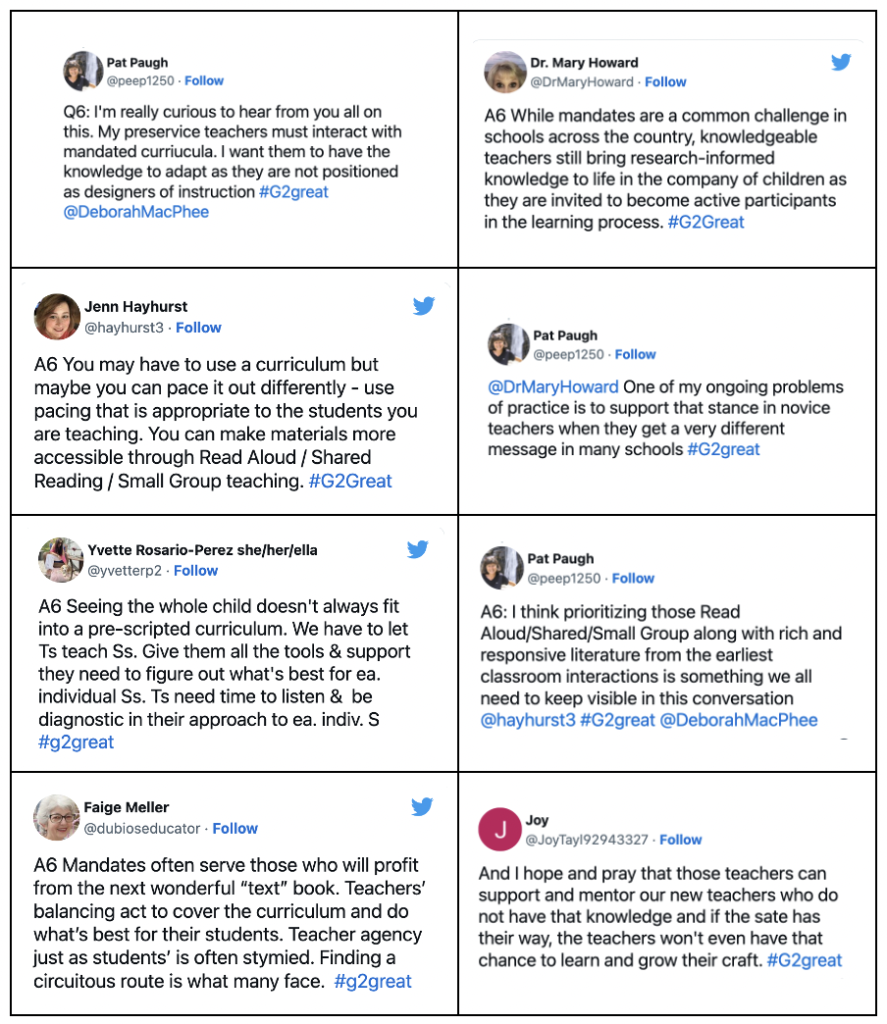
Note that you can see all of the #G2Great Twitter responses HERE
This a good time to pause again to see how Patricia and Deborah responded to our second book reflection question:
What are your BIG takeaways from your book that you hope teachers will embrace in their teaching practices?
Deborah: “There are many things that I hope teachers embrace from this book, but most importantly I hope that the teachers who read it understand that they are the most important factor in educating children. With that, I hope it gives them confidence to continue to seek out knowledge across cognitive, socio-cultural, affective, and critical dimensions and courage to trust themselves as they apply that knowledge in practice, keeping children at the center.”
Pat “In the course of writing this book, we spoke with teachers and adult family members and asked what questions they had about how the children in their care learned to read. One common comment was that there was a need by the family members to know what to ask when in dialogue with their child’s teacher. In the final chapter we provide some guiding questions for both teachers and family members to use for those meetings. A second comment was from teachers who wanted information to support a responsive way to navigate the school curriculum to teach and assess their students. A third was to provide a frame for evaluating current instruction in a school setting to ensure that students were receiving the skills and also the dispositions necessary to become independent and effective users of their literacies. Our ALL framework (Active Literacy Learning) provides set of criteria based on the best in the field to ask what are we doing and what else needs doing in a classroom as well as in a school.”
MY FINAL THOUGHTS
Having read this beautifully crafted co-collaboration from Pat Paugh and Deborah MacPhee, it is my hope that every primary educator will hold this book close and refer to it often. Our primary responsibility to our children is an act of KNOWING and Pat and Deborah ensure they provide this support across their pages for their book:
Know the Research.
Know the Child.
KNOW research-informed instructional practices.
KNOW how to engage in professional decision-making that is responsive to the needs of children based not on mandates but on our critical KNOWINGS.
On page xvii, Pat and Deborah said what feels like the perfect closing:
“We are unabashedly on the side of every child who is striving to become literate.”
I believe that this is the very heart & soul of Learning to be Literate and our ability to honor MORE THAN A SINGLE STORY. Pat and Deborah remind us that we cannot allow taking “SIDES” to block our view of this beautiful perspective. This essential book supports us as we focus on what matters most: CHILDREN
I’d like to end this post with the inspired thinking of Pat and Deborah as we turn back to our author reflections in our third question
What is a message from the heart you would like for every teacher to keep in mind?
Deborah: “You are in a position to make a positive difference for every child (and family) who enters your classroom. Keep learning, trust yourself, and always reflect on your practice in the light of new knowledge.”
Pat: “One of my favorite children’s books is about Shirley Chisholm, the first Black woman in Congress. The title is Shirley Chisholm is a Verb (by Veronica Chambers). My rif on that is Literacy is a Verb! All our young learners should “do” things with their literacy to participate in their world – just like Shirley Chisholm.”
On behalf of our #G2Great Twitter Chat team, I would like to express our deep gratitude to Pat Paugh and Deborah MacPhee for giving us so much rich food for thought and the wonderful ideas to put that thinking into glorious action. They have encouraged us to hold tight to the idea that our choices must reflect MORE THAN A SINGLE STORY and always in the name of ‘children as our collective inspiration.’ Thank you for giving us all the support we need to make that a reality Pat and Deborah!
AUTHOR BIO
Patricia Paugh is a professor in the College of Education and Human Development at the University of Massachusetts Boston, where she teaches literacy methods courses and is graduate program director for elementary education. Pat’s scholarship is centered on issues of critical and disciplinary literacy in early childhood and elementary education primarily through collaborative research with teachers in urban classrooms. Her work has been published in academic and professional journals including: Language Arts, Journal of Literacy Research, Reading Research Quarterly, Literacy Researcher: Theory, Method, Practice, and Teaching Education. She has also published three co-edited volumes focused on literacy learning: Teaching toward democracy with post-modern and popular culture texts, A classroom teacher’s guide to struggling writers, and A classroom teacher’s guide to struggling readers. Pat brings an extensive background as a first-grade teacher and elementary reading specialist to her current practice as a teacher educator in a public university and as an advocate for teachers’ professionalism. She also currently serves as co-editor for Talking Points, a journal of the National Council of Teachers of English.
Deborah MacPhee is a professor in the School of Teaching and Learning at Illinois State University in Normal, Illinois, where she teaches literacy methods courses for undergraduates and directs the Mary and Jean Borg Center for Reading and Literacy. Deborah’s research critically examines discourses of literacy coaching and professional development school interactions and metaphors used in media portrayals of the science of reading. Her work has been published in several academic and professional journals, including Reading Research Quarterly, The Reading Teacher, The International Journal of Mentoring and Coaching in Education, School-University Partnerships, and The New Educator. Deborah is a former first and second grade teacher who currently assesses and tutors students who experience difficulty learning to read.
Interview by the NCTE Standing Committee on Assessment by Bobbie Kabuto from Queens College.
TITLE: Literacy Assessment as Advocacy: Learning to Be Literate: More than a Single Story,
Part I: https://ncte.org/blog/2022/09/literacy-assessment-advocacy-part-i/
Part II: https://ncte.org/blog/2022/11/literacy-assessment-advocacy-part-ii/
